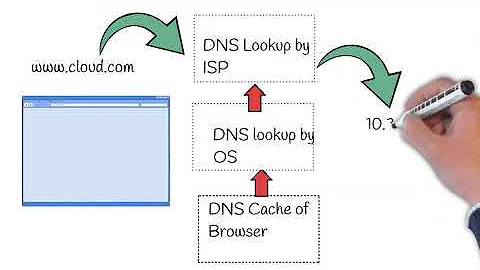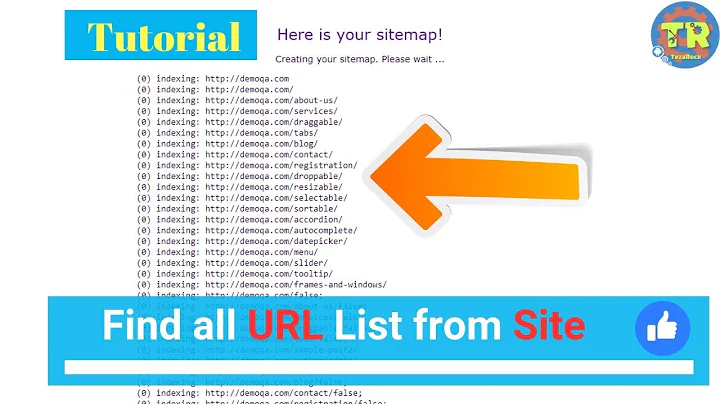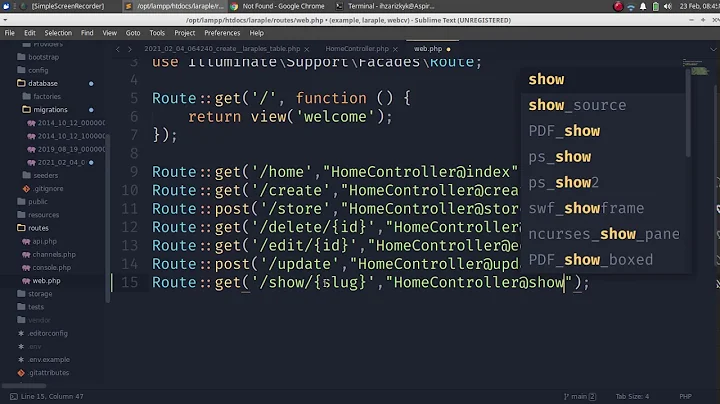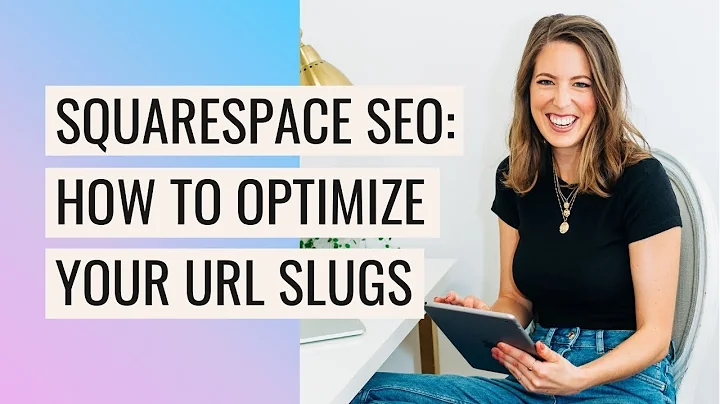Why do some websites add "Slugs" to the end of URLs?
Solution 1
The slugs make the URL more user-friendly and you know what to expect when you click a link. Search engines such as Google, rank the pages higher if the searchword is in the URL.
Solution 2
Usability is one reason, if you receive that link in your e-mail, you know what to expect. SEO (search engine optimization) is another reason. Search engines such as google will rank your page higher for the keywords contained in the url
Solution 3
I recently changed my website url format from:
www.mywebsite.com/index.asp?view=display&postid=100
To
www.mywebsite.com/this-is-the-title-of-the-post
and noticed that click through rates to article increased about 300% after the change. It certainly helps the user decide if what they're thinking of clicking on is relevant, in terms of SEO purposes though I have to say I've seen little impact after the change
Solution 4
I agree with other responses that any mis-typed slug should 301-redirect to the proper form. In other words, https://stackoverflow.com/questions/47427/wh should redirect to https://stackoverflow.com/questions/47427/why-do-some-websites-add-slugs-to-the-end-of-urls . It has one other benefit that hasn't been mentioned--if you do not do a redirect to a canonical URL, it will appear that you have a near-infinite number of duplicate pages. Google hates duplicate content.
That said, you should really only care about the content ID and allow any input for the slug as long as you redirect. Why?
https://stackoverflow.com/questions/47427/why-do-some-websites-add-slugs-to-the-end-of-urls
... Oops, the mail software cut off the end of the URL! No problem though because you still can roll with just https://stackoverflow.com/questions/47427
The one big problem with this approach is if you derive the slug from the title of your content, how are you going to deal with non-ASCII, UTF-8 titles?
Solution 5
The reason most sites use it is probably SEO (Search Engine Optimization). Yahoo used to give a reasonable weighting to the presence of the search keyword in the URL itself, and it also helped in the Google result as well.
More recently the search engines have lowered the weighting given to keywords in the URL, likely because the technique is now more common on spam sites than legitimate. Keywords in the URL now have only a very minor impact on the search results, if at all.
As for stackoverflow itself, SEO might be a motivation (old habits die hard) or simply for usability.
Related videos on Youtube
David Webb
Updated on July 08, 2022Comments
-
David Webb almost 2 years
Many websites, including this one, add what are apparently called slugs - descriptive but as far as I can tell useless bits of text - to the end of URLs.
For example, the URL the site gives for this question is:
https://stackoverflow.com/questions/47427/why-do-some-websites-add-slugs-to-the-end-of-urlsBut the following URL works just as well:
https://stackoverflow.com/questions/47427/Is the point of this text just to somehow make the URL more user friendly or are there some other benefits?
-
 Armstrongest about 14 yearsslugs serve as URL's Caller ID Name. When you get a phone call, knowing the person's name isn't necessary, but it helps you decide whether you want to pick up the phone or not. Likewise, a URL slug helps the user decide if they want to click on the link and gives it some intrinsic context.
Armstrongest about 14 yearsslugs serve as URL's Caller ID Name. When you get a phone call, knowing the person's name isn't necessary, but it helps you decide whether you want to pick up the phone or not. Likewise, a URL slug helps the user decide if they want to click on the link and gives it some intrinsic context. -
Dienekes over 13 years^^ +1, but it'd have been better to see your reply as an Answer rather than a comment..
-
Jay Smoke almost 9 yearshelps with rankings in search engine results.
-
Mohammed H about 8 yearsstackoverflow.com/q/47427 also works :P
-
-
Xian over 15 yearsOne of the things that make a url user-friendly is 'discover-ability', meaning you can take a guess at url's simply from the address bar. i.love.pets.com/search/cats+dogs could easily lead to i.love.pets.com/search/pug+puppies etc
-
Kyle Cronin over 15 yearsThe Digg link was the first one I came across when going down the main page. It's purely coincidental that it also so happens to exemplify how far Digg has fallen - a story about sex addiction has been posted three times.
-
 Jakub Šturc over 15 yearsIs this kind a bug or feature?
Jakub Šturc over 15 yearsIs this kind a bug or feature? -
Juha Syrjälä over 15 yearsThis is most likely a feature. The slug is ignored when server is deciding which question to show. The question is fetched solely based on its id (47427 in this case).
-
Dirk Vollmar about 15 yearsAn in fact it makes sure that you can access a post even after the subject has been modified (and thus there is a new URL).
-
Mathias Bynens about 15 yearsNice post, very valid point! +1 As for your question, "how are you going to deal with non-ascii, UTF8 titles?" There are algorithms for this, for example the one WordPress uses. I would post a PHP solution for this exact problem if more than 600 characters were allowed. If you really want to know, post it as a question and I'll be happy to answer it ;)
-
DisgruntledGoat almost 15 yearsre: "near-infinite number of duplicate pages" - that will only happen if there are links to the non-canon URL. If you keep it consistent within your site there shouldn't be a problem. Your theory about URLs being cut off is kinda silly, the URL could be cut off anywhere, right? Even after 4742, which would lead to a different question. As long as you stick to just standard letters, numbers, dashes and/or underscores in the URL that's less likely to happen.
-
eyelidlessness almost 15 yearsXian, I've heard that argument before, but I don't think it stands up to scrutiny. Apart from geeks, hardly anyone really types URLs directly. Readability is definitely important, and I think a growing number of users see the URLs, but when it comes to "guessing" I think the minority is extremely tiny.
-
Alix Axel almost 15 yearsThat's why canonical pages exists, and Stack Overflow uses them. =)
-
Joseph Ferris over 14 years@eyelidlessnes - I will have to disagree. While people might not manually enter URLs, I have seen evidence that they create them. Through looking at our logs and our monitoring devices, we see samples where one user session will do something and then modify the URL (evidenced by the lack of a referrer). Granted, not everyone is doing it - but it definitely is not a negligible amount of traffic.
-
 Austyn Mahoney over 14 yearsAs DisgruntledGoat suggested, Google technically wouldn't find any duplicate content unless someone linked to the page with a different slug, therefore tricking google's spider into thinking there is duplicate content. So the spider will hate this page, way to go guys ;)
Austyn Mahoney over 14 yearsAs DisgruntledGoat suggested, Google technically wouldn't find any duplicate content unless someone linked to the page with a different slug, therefore tricking google's spider into thinking there is duplicate content. So the spider will hate this page, way to go guys ;) -
 Armstrongest about 14 years@Xian. Yes, few type URLS, however, the slug is essentially caller id. The name of the caller is not NECESSARY but it helps you decide if you want to answer the call or not. slugs make a URL look more friendly and makes a user more likely to click it.
Armstrongest about 14 years@Xian. Yes, few type URLS, however, the slug is essentially caller id. The name of the caller is not NECESSARY but it helps you decide if you want to answer the call or not. slugs make a URL look more friendly and makes a user more likely to click it. -
 Armstrongest about 14 yearsSEO's a factor. But more importantly, it's about usability, like you said.
Armstrongest about 14 yearsSEO's a factor. But more importantly, it's about usability, like you said. -
 Armstrongest about 14 yearsView the Page Source and you'll find this: <link rel="canonical" href="stackoverflow.com/questions/47427/…"> See: here: googlewebmastercentral.blogspot.com/2009/02/…
Armstrongest about 14 yearsView the Page Source and you'll find this: <link rel="canonical" href="stackoverflow.com/questions/47427/…"> See: here: googlewebmastercentral.blogspot.com/2009/02/… -
 Armstrongest about 14 yearsYou've obviously never been Rick Roll'd, have you. How many links do you receive that are: Check this out. Hilarious! <link>. It would be nice if Youtube did Urls like so: youtube.com/12345/evil-bikini-wax-job-not-work-safe. It would make the links more trustworthy and help me make the decision to click or not.
Armstrongest about 14 yearsYou've obviously never been Rick Roll'd, have you. How many links do you receive that are: Check this out. Hilarious! <link>. It would be nice if Youtube did Urls like so: youtube.com/12345/evil-bikini-wax-job-not-work-safe. It would make the links more trustworthy and help me make the decision to click or not. -
Kibbee about 14 yearsIt would, however, any MVC system I've seen doesn't require the extra evil-bikini-wax-job-not-work-safe part, and could just as easily be sent as youtube.com/12345, and most people who wanted to mail out stuff like that would quickly learn to remove it.
-
Mathias Bynens about 14 years@Alix Axel: 301 redirects
>canonical pages -
netrox almost 14 yearsxian, exactly how is that different from google.com/search?q=cat+puppy ? People who discover URL's will likely do that. I do that.
-
Nikita Rybak over 13 yearsI hope your post titles never, ever change: a lot of people hate dead links and webservices producing them.
-
Mike Clark over 13 yearsWhy do you think Google made this decision? What motivated it?
-
chainwork almost 13 yearsCan you find any documentation from Google that specifically states they will rank a page higher if the keyword is contained in the url?
-
Cyde Weys about 12 yearsI can't really guess which CMS or blogging software he's using, but for WordPress and lots of similar ones, modifying the post title after the post has already gone live does not change the slug (and for exactly the reason you mention).
-
 Michiel van Oosterhout over 11 years@chainwork No, but there's hundreds of signals that a search engine uses to rank pages, and you can be sure that the URL is one such signal.
Michiel van Oosterhout over 11 years@chainwork No, but there's hundreds of signals that a search engine uses to rank pages, and you can be sure that the URL is one such signal. -
chainwork over 11 yearsKeywords in the url that match the search are bolded in Google results thus making them stand out more to users conducting the search.
-
Ethan over 11 yearsTechnically, you need not do a 301 redirect if you embed the rel="canonical" hint in the page. Irrespective of the "near infinite number of duplicate pages", google will take the only valid canonical URL. Amazon doesn't do the 301. Try it: amazon.com/lat-thinking-stragies/dp/0470942185 However, it's better to do both. Reason is someone can publish the link with a totally modified slug and when the viewer reads it, it looks different from the content -- confusing the viewer.
-
Stijn de Witt almost 8 years"how are you going to deal with non-ascii, UTF8 titles?" You percent-encode them. All modern browsers will then actually show the Unicode in all it's multilingual glory in the address bar, but give you an ASCII, percent-encoded URL when you copy to the clipboard.
-
Lawrence Dol over 2 yearsSince the SLUG is ignored, the sender could just send
youtube.com/12345/how-programmers-are-fooled, no?












